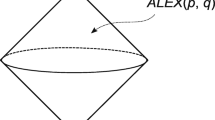Abstract
In his recent article ‘On Relativity Theory and Openness of the Future’ (1991), Howard Stein proves not only that one can define an objective becoming relation in Minkowski spacetime, but that there is only one possible definition available if one accepts certain natural assumptions about what it is for becoming to occur and for it to be objective. Stein uses the definition supplied by his proof to refute an argument due to Rietdijk (1966, 1976), Putnam (1967) and Maxwell (1985, 1988) that Minkowski spacetime leaves no room for objective becoming whatsoever. However, Stein's proof does not seem to go far enough. By considering only what events have become from the standpoint of any given event, Stein's uniqueness proof fails from the outset to allow for a more general kind of becoming whereby it is understood to occur from the standpoint of events on the particular worldlines followed by observers. This suggests that there may, after all, be more than one way to define objective becoming in Minkowski spacetime once each observer's worldline is allowed to figure in the definition. This suspicion is further aroused by two recent proposals for objective, worldline-dependent becoming due to Peacock (1992) and Muller (1992) who advocate ways of defining becoming that are not equivalent to the definition Stein's uniqueness proof delivers. Nevertheless, we show that Stein's uniqueness proofcan be extended in a natural way to cover this more general kind of becoming, provided one does not enrich standard Minkowski spacetime by privileging certain sets of worldlines over others in an unwarranted manner. Thus we aim to reinforce Stein's point that standard Minkowski spacetime does make room for objective becoming, but in essentially only one way, despite arguments and proposals to the contrary.
Similar content being viewed by others
References
Boolos, G. S. and R. C. Jeffrey: 1974,Computability and Logic, Cambridge University Press, Cambridge.
Clifton, R., C. Pagonis, and I. Pitowsky: 1992, ‘Relativity, Quantum Mechanics and EPR’, in D. Hull, M. Forbes, and K. Okruhlik (eds.),PSA 1992 Volume 1, Philosophy of Science Association, East Lansing, Michigan, pp. 114–28.
Earman, J.: 1974, ‘An Attempt to Add a Little Direction to “The Problem of the Direction of Time”’,Philosophy of Science 41, 15–47.
Earman, J.: 1986,A Primer on Determinism, D. Reidel, Dordrecht.
Hogarth, M.: 1993, ‘Metrical Realism and the Conventionality of Simultaneity’, Cambridge University, preprint.
Kroes, P.: 1984, ‘Objective Versus Mind-Dependent Theories of Time Flow’,Synthese 61, 423–46.
Mackie, J. L.: 1974,The Cement of the Universe, Clarendon Press, Oxford.
Malament, D.: 1977, ‘Causal Theories of Time and the Conventionality of Simultaneity’,Noûs 11, 293–300.
Maxwell, N.: 1985, ‘Are Probabilism and Special Relativity Incompatible?’,Philosophy of Science 52, 23–43.
Maxwell, N.: 1988, ‘Discussion: Are Probabilism and Special Relativity Incompatible?’,Philosophy of Science 55, 640–45.
Muller, F. A.: 1992, ‘Worldlines are Growing! On Ontological Fatalism, Temporal Becoming and the Special Theory of Relativity’, Utrecht University, preprint.
Peacock, K.: 1992, ‘A New Look at Simultaneity’, in D. Hull, M. Forbes, and K. Okruhlik (eds.),PSA 1992 Volume 1, Philosophy of Science Association, East Lansing, Michigan, pp. 542–52.
Putnam, H.: 1967, ‘Time and Physical Geometry’,The Journal of Philosophy 64, 240–47.
Rietdijk, C. W.: 1966, ‘A Rigorous Proof of Determinism Derived from the Special Theory of Relativity’,Philosophy of Science 33, 341–44.
Rietdijk, C. W.: 1976, ‘Discussion: Special Relativity and Determinism’,Philosophy of Science 43, 598–609.
Sklar, L.: 1981, ‘Time, Reality and Relativity’, in R. Healey (ed.),Reduction, Time and Reality, Cambridge University Press, Cambridge, pp. 129–42.
Stein, H.: 1968, ‘On Einstein-Minkowski Space-Time’,The Journal of Philosophy 65, 5–23.
Stein, H.: 1991, ‘On Relativity Theory and the Openness of the Future’,Philosophy of Science 58, 147–67.
Whitrow, G. J.: 1961,The Natural Philosophy of Time, Nelson and Sons, London.
Author information
Authors and Affiliations
Rights and permissions
About this article
Cite this article
Clifton, R., Hogarth, M. The definability of objective becoming in Minkowski spacetime. Synthese 103, 355–387 (1995). https://doi.org/10.1007/BF01089733
Issue Date:
DOI: https://doi.org/10.1007/BF01089733



